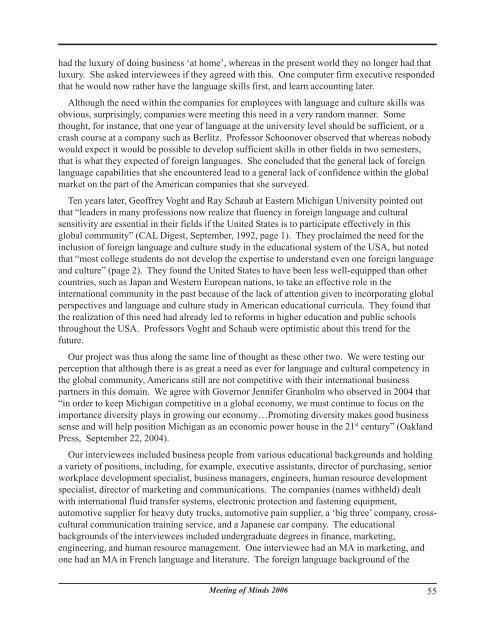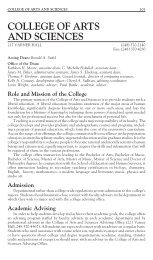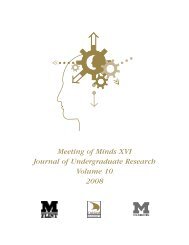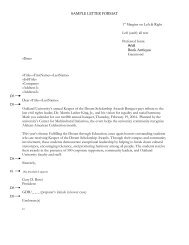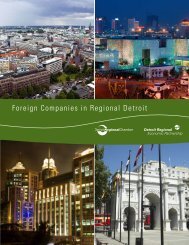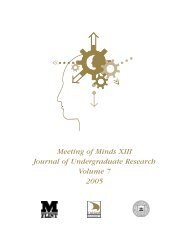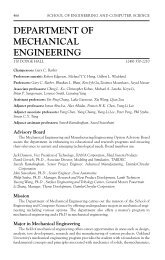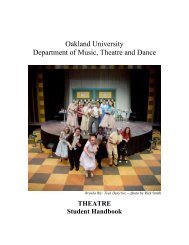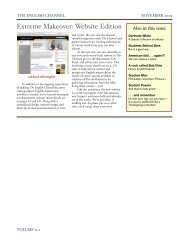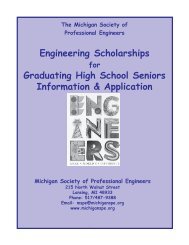MOM 2006 journal for pdf.pmd - University of Michigan-Flint
MOM 2006 journal for pdf.pmd - University of Michigan-Flint
MOM 2006 journal for pdf.pmd - University of Michigan-Flint
You also want an ePaper? Increase the reach of your titles
YUMPU automatically turns print PDFs into web optimized ePapers that Google loves.
had the luxury <strong>of</strong> doing business ‘at home’, whereas in the present world they no longer had that<br />
luxury. She asked interviewees if they agreed with this. One computer firm executive responded<br />
that he would now rather have the language skills first, and learn accounting later.<br />
Although the need within the companies <strong>for</strong> employees with language and culture skills was<br />
obvious, surprisingly, companies were meeting this need in a very random manner. Some<br />
thought, <strong>for</strong> instance, that one year <strong>of</strong> language at the university level should be sufficient, or a<br />
crash course at a company such as Berlitz. Pr<strong>of</strong>essor Schoonover observed that whereas nobody<br />
would expect it would be possible to develop sufficient skills in other fields in two semesters,<br />
that is what they expected <strong>of</strong> <strong>for</strong>eign languages. She concluded that the general lack <strong>of</strong> <strong>for</strong>eign<br />
language capabilities that she encountered lead to a general lack <strong>of</strong> confidence within the global<br />
market on the part <strong>of</strong> the American companies that she surveyed.<br />
Ten years later, Ge<strong>of</strong>frey Voght and Ray Schaub at Eastern <strong>Michigan</strong> <strong>University</strong> pointed out<br />
that “leaders in many pr<strong>of</strong>essions now realize that fluency in <strong>for</strong>eign language and cultural<br />
sensitivity are essential in their fields if the United States is to participate effectively in this<br />
global community” (CAL Digest, September, 1992, page 1). They proclaimed the need <strong>for</strong> the<br />
inclusion <strong>of</strong> <strong>for</strong>eign language and culture study in the educational system <strong>of</strong> the USA, but noted<br />
that “most college students do not develop the expertise to understand even one <strong>for</strong>eign language<br />
and culture” (page 2). They found the United States to have been less well-equipped than other<br />
countries, such as Japan and Western European nations, to take an effective role in the<br />
international community in the past because <strong>of</strong> the lack <strong>of</strong> attention given to incorporating global<br />
perspectives and language and culture study in American educational curricula. They found that<br />
the realization <strong>of</strong> this need had already led to re<strong>for</strong>ms in higher education and public schools<br />
throughout the USA. Pr<strong>of</strong>essors Voght and Schaub were optimistic about this trend <strong>for</strong> the<br />
future.<br />
Our project was thus along the same line <strong>of</strong> thought as these other two. We were testing our<br />
perception that although there is as great a need as ever <strong>for</strong> language and cultural competency in<br />
the global community, Americans still are not competitive with their international business<br />
partners in this domain. We agree with Governor Jennifer Granholm who observed in 2004 that<br />
“in order to keep <strong>Michigan</strong> competitive in a global economy, we must continue to focus on the<br />
importance diversity plays in growing our economy…Promoting diversity makes good business<br />
sense and will help position <strong>Michigan</strong> as an economic power house in the 21 st century” (Oakland<br />
Press, September 22, 2004).<br />
Our interviewees included business people from various educational backgrounds and holding<br />
a variety <strong>of</strong> positions, including, <strong>for</strong> example, executive assistants, director <strong>of</strong> purchasing, senior<br />
workplace development specialist, business managers, engineers, human resource development<br />
specialist, director <strong>of</strong> marketing and communications. The companies (names withheld) dealt<br />
with international fluid transfer systems, electronic protection and fastening equipment,<br />
automotive supplier <strong>for</strong> heavy duty trucks, automotive pain supplier, a ‘big three’ company, crosscultural<br />
communication training service, and a Japanese car company. The educational<br />
backgrounds <strong>of</strong> the interviewees included undergraduate degrees in finance, marketing,<br />
engineering, and human resource management. One interviewee had an MA in marketing, and<br />
one had an MA in French language and literature. The <strong>for</strong>eign language background <strong>of</strong> the<br />
Meeting <strong>of</strong> Minds <strong>2006</strong> 55


